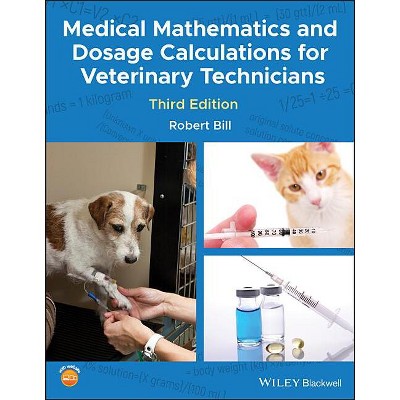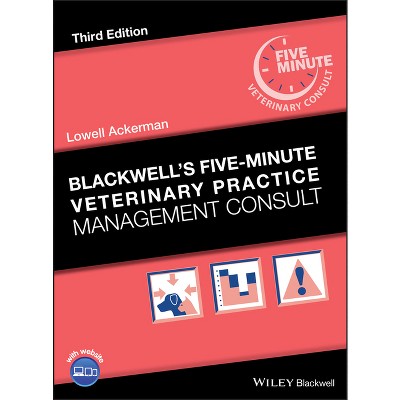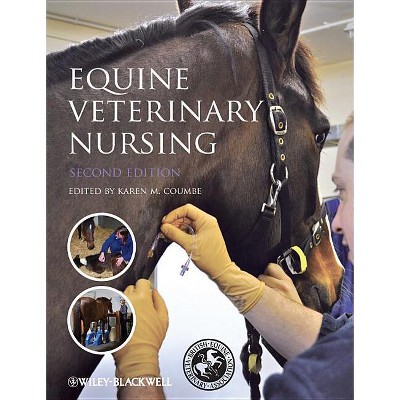About this item
Highlights
- Decision-Making in Veterinary Practice The first-ever guide to rational decision-making in veterinary practice The practice of veterinary medicine entails crucial decisions about patient care on a daily basis.
- About the Author: Barry Kipperman, DVM, DACVIM, MSc, DACAW, is a specialist in small animal internal medicine and animal welfare.
- 272 Pages
- Medical, Veterinary Medicine
Description
About the Book
"During author's 33 years as a small animal internal medicine specialist interacting with patients, clients, associates, practice owners, technicians, and referring veterinarians, and teaching students and interns, he realized that there is an absence of principles or strategies to guide veterinary practitioners in the process of rational decision-making on behalf of patients. This sometimes results in decisions which, when examined retrospectively, appear to be irrational, or difficult to justify based on information in medical records. In author's experience, each hospital has a unique culture or philosophy of practice which profoundly influences the way in which its clinicians make decisions. These influences are known as the "hidden curriculum," where clinicians are implicitly expected to adopt systems and protocols that align with the philosophy of the practice. For example, whether a specific practice customarily sends patients home shortly after routine surgery or keeps these cases in the hospital overnight. Some practices encourage their clients to pursue diagnoses while others prioritize therapeutic trials. To mitigate cognitive dissonance and interpersonal conflicts, most clinicians unknowingly modify their behaviors to align with each hospital's expectations. This process of doing what is expected of you or what your employer has done preceding you, is quite understandable. But when scrutinized, this practice tends to diminish care uniquely tailored to each client and patient in lieu of adhering to historical precedents or hospital-based protocols. Such behaviors are often justified by statements such as "That's the way we've always done it." These arguments delay a willingness to embrace new scientific evidence or practice in accord with evolving societal expectations. Many of these expected actions also conflict with what veterinary students have been taught are evidence-based approaches to practice"--Book Synopsis
Decision-Making in Veterinary PracticeThe first-ever guide to rational decision-making in veterinary practice
The practice of veterinary medicine entails crucial decisions about patient care on a daily basis. Whether to admit patients displaying symptoms, whether to pursue diagnoses or prioritize therapeutic trials, whether to advise overnight stays after routine surgery, whether to refer patients; the answers to questions like these can significantly influence patient outcomes and standards of care. However, veterinary clinicians are seldom trained to analyze their patterns of decision-making, relying instead on the existing culture of a practice to dictate their behaviors. This can lead to irrational decisions, institutional inertia, reluctance to comply with evidence-based medicine, and failure to optimize patient outcomes.
Decision-Making in Veterinary Practice provides the first-ever dedicated guide to rational principles for decision-making in veterinary practice. Rooted in the study of normative ethics, it seeks to pose important questions and develop processes by which they can be answered. The book promises to transform the clinical performance of clinicians and practices that utilize it.
Decision-Making in Veterinary Practice readers will also find:
- Discussions of key issues based on extensive clinical experience and evidence
- Detailed discussion of important decision determinants like time of day, patient weight, criteria for stopping treatment, and more
- Essential insights on clinical decision-making and clinical reasoning
Decision-Making in Veterinary Practice is ideal for all veterinary practitioners, veterinary students, and clinical skills instructors.
"Decision Making in Veterinary Practice offers expert medical knowledge and an ethical sensibility to illuminate everyday veterinary issues like animal euthanasia, treatment of elderly patients, and moral stress. The result is an unparalleled practical road map to fulfilling the patient advocacy role of the veterinarian. I wish I had the benefit of Dr. Kipperman's wisdom when I was a young veterinarian. All veterinarians should read this terrific book--veterinary students, new graduates, and seasoned professionals."
Simon Coghlan, PhD, BVSc
University of Melbourne
Victoria, Australia
"Decision Making in Veterinary Practice is a detailed and thoughtful discussion of many key aspects of veterinary clinical decision making. Drawing from decades of personal experience as an internal medicine specialist and practice owner, Dr. Kipperman provides numerous realistic case examples to illustrate both the challenges facing clinicians and many potentially helpful strategies for improving decision- making and optimizing patient outcomes."
Brennen McKenzie, MA, MSc, VMD
Adobe Animal Hospital
Los Altos, CA
"Decision Making in Veterinary Practice is a helpful resource focused on how decisions are made, and how decision-making can be improved in the interests of veterinary patients. It contains many excellent case examples documenting positive and negative outcomes of decisions. A unique aspect of this book is its disclosures of Dr. Kipperman's experiences as an internist - including humble accounts of lessons learned and insights into the moral distress experienced by veterinary specialists."
Anne Quain, BVSc, MVetStud
Sydney School of Veterinary Science
Sydney, Australia
From the Back Cover
The first-ever guide to rational decision-making in veterinary practice
The practice of veterinary medicine entails crucial decisions about patient care on a daily basis. Whether to admit patients displaying symptoms, whether to pursue diagnoses or prioritize therapeutic trials, whether to advise overnight stays after routine surgery, whether to refer patients; the answers to questions like these can significantly influence patient outcomes and standards of care. However, veterinary clinicians are seldom trained to analyze their patterns of decision-making, relying instead on the existing culture of a practice to dictate their behaviors. This can lead to irrational decisions, institutional inertia, reluctance to comply with evidence-based medicine, and failure to optimize patient outcomes.
Decision-Making in Veterinary Practice provides the first-ever dedicated guide to rational principles for decision-making in veterinary practice. Rooted in the study of normative ethics, it seeks to pose important questions and develop processes by which they can be answered. The book promises to transform the clinical performance of clinicians and practices that utilize it.
Decision-Making in Veterinary Practice readers will also find:
- Discussions of key issues based on extensive clinical experience and evidence
- Detailed discussion of important decision determinants like time of day, patient weight, criteria for stopping treatment, and more
- Essential insights on clinical decision-making and clinical reasoning
Decision-Making in Veterinary Practice is ideal for all veterinary practitioners, veterinary students, and clinical skills instructors.
About the Author
Barry Kipperman, DVM, DACVIM, MSc, DACAW, is a specialist in small animal internal medicine and animal welfare. Dr. Kipperman founded a small animal specialist and emergency hospital in the San Francisco Bay Area and spent 33 years in practice before transitioning to teaching and writing. He is a Lecturer in Veterinary Ethics at the University of California at Davis, School of Veterinary Medicine, Davis, CA, USA and Adjunct Associate Professor at the University of Missouri College of Veterinary Medicine, Columbia, MO, USA.
Shipping details
Return details
Trending Diet, Health & Fitness Books












